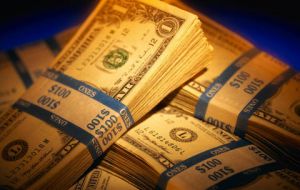MercoPress. South Atlantic News Agency
More doubts about the US economy and fears of a “W” dip
 The US economy has yet to come out of the woods
The US economy has yet to come out of the woods A number of influential economists and analysts warn of a double dip recession, even as the US economy slogs toward recovery. Well-known analyst Meredith Whitney, Chief Executive Officer of the Meredith Whitney advisory group, recently expressed pessimism about the economy in an interview on CNBC, a cable TV station.
The economy may be headed for a “W” that is, another plunge after a short rebound in 2010, although it may not be as severe as last year's economic nose dive, Whitney said. And this week Market Watch head economist Irwin Kellner wrote that the recovery seems to be losing steam and that it may take on a “w” form.
Indeed, the US government earlier this week revised third quarter growth figures down from its earlier calculation of 3.5% the highest in two years to 2.8%. Market Watch's economists project a 2.5% growth rate in the next quarter, due to falling consumer spending, sluggish personal incomes and a record 14% of homeowners who are either in foreclosure or behind on payments.
A number of other well-known economists also warn a second drop is possible, including Nobel Prize laureate Paul Krugman.
During his recent trip to China, US President Barack Obama told Fox News that too much US debt could spark a second dip, although some economists suggested the statement was simply a message to critics that he is taking seriously the skyrocketing US deficit (13% of GDP, highest since Word War II).
But while some economists point to factors that could derail recent gains such as a commercial real estate collapse, increasing unemployment or the fall of a large, multi-national bank, others argue a double dip is unlikely.
Michael Mussa, senior fellow at the Peterson Institute for International Economics and former chief economist at the International Monetary Fund, said: ”You can't exclude that a large asteroid could hit the US and cause another shock. But I don't see any reason to anticipate (a double dip) as a likely event.“
The last one occurred in the early 80s and he does not expect an year-term repeat, although a slide a few years down the road can not be ruled out, he said.
”We are clearly in the process of recovery led by Asia and spreading to the rest of the world,“ he said. ”And that recovery will continue and we are unlikely at a global level to have anything like a double dip.“
Still, Dean Baker, co-director at the Washington, DC based Centre for Economic and Policy Research, said the US economy is not out of the woods yet. This quarter's growth, coupled with levels of unemployment not seen since the early 80s, is looking weak. That makes anything possible, including a double dip, he said.
Ben Carliner, director of research at the Washington, DC based Economic Strategy Institute, said ”The greater risk of a double dip recession would be caused by the government's stimulus program ending too early“.
US unemployment continues to rise, companies and consumers are still de-leveraging, and interest rates remain the same, he said. ”If we do have a double dip recession, the cause will be that private sector demand is still too anaemic to drive a recovery, and (the stimulus) has been unable to fill the gap,“ he said.
But over the next five to 10 years, the public fiscal position will need to be consolidated, although it is too early to talk about exit strategies, he said. ”While much of the recent economic data has been encouraging, the financial markets have been running well ahead of the real economy, and the recovery that we have seen is too precarious and short-lived for us to be able to declare victory at this point,“ he said.
Robert Johnson, associate director of economic analysis at Morningstar, an independent research provider, foresees no double dip recession, and said many factors are ”stacked up over the next couple of quarters“ that would prevent such a slide.
”A good year is in front of us“ he said, adding that while growth may slow somewhat, it is unlikely to sink to the dismal numbers seen earlier this year. The economy shrank by 0.7% in the second quarter and by 6.4% in the first quarter.
Much of the stimulus money has yet to be spent, the auto industry is turning a corner and housing starts will improve slowly, he said. While a fall in commercial real estate could slow economic growth, it is unlikely to derail the recovery, as it is small to mid size banks not the major banks at the heart of the financial system that are more exposed to that sector. ”Small to mid sized banks may be hurt but it won't ruin whole system”.




Top Comments
Disclaimer & comment rulesCommenting for this story is now closed.
If you have a Facebook account, become a fan and comment on our Facebook Page!